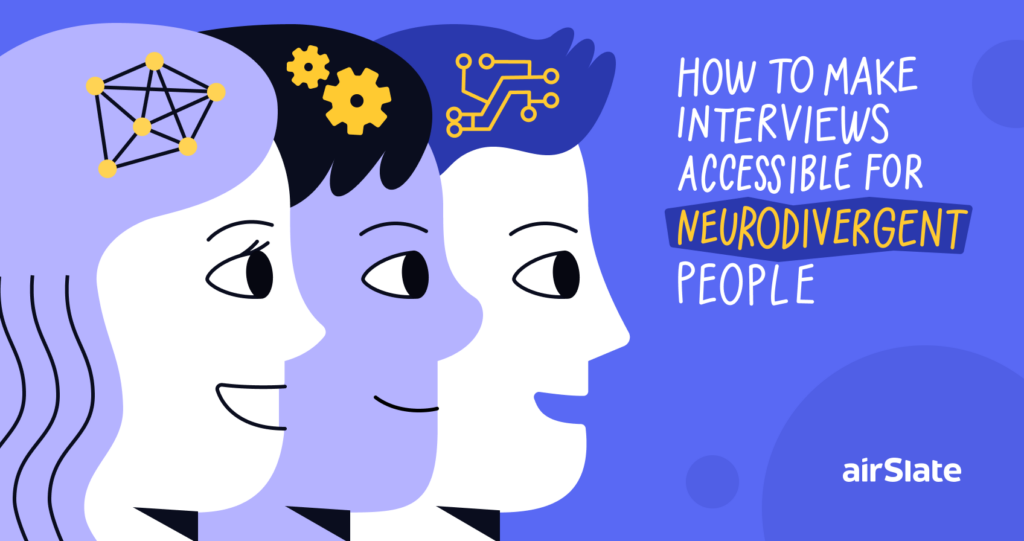
How do you establish hiring practices that are as equitable as possible, to ensure every individual has a chance to showcase their talents and potential in the interview process?
Creating an accessible interview process for neurodivergent people requires sensitivity, flexibility, and an understanding of the challenges they may face. In one of our latest articles we explored how to create a more inclusive hiring and work environment for neurodiverse individuals. Make sure to check it out!
How to conduct interviews with neurodivergent candidates
Here is a list of actionable steps you can take to ensure your team is able to see past a candidate’s first impression, and into their long term potential at your company:
- Allow candidates to take breaks during long interview sessions
- Ask candidates to speak about wins and accomplishments to encourage them to open up and relax
- Instead of interrogating a candidate from across a table, take a walk outdoors
- Assess in advance what skills, traits, and capabilities you are seeking in a candidate, formalize questions accordingly, and create a specific grading criterion for each candidate based on their responses
- Avoid hiring on ‘gut’ instinct, which can quickly turn into a popularity contest. Instead, create a structured interview with an objective and measurable assessment system
- Try to avoid penalizing candidates for being calm, quiet, subdued, or shy. This doesn’t necessarily mean they won’t be competent in the job
- Base your decision on job competence instead of bravado. Introverts tend to undersell themselves
- Ask lots of questions and be prepared to listen. Use the three second rule: wait three seconds until someone is finished speaking before you interject. This may allow an introvert more time to think or warm up, which may encourage more sharing about their experience and skills.
For example, introverts take a while to collect their thoughts and search for the best answer. Allow them this time to think through their answers, and become comfortable with silent pauses - Avoid ‘gotcha’ questions. You aren’t hiring based on someone’s ability to B.S. You are hiring on their ability to do the job. Stressing candidates out with irrelevant brain teasers will only make it more difficult for them to put their best foot forward. That is probably why Google finally eliminated its infamous over the top riddle interview questions. For example, people on the spectrum find spontaneity very stressful. To make them feel comfortable, over prepare the candidate by sending questions or requests in advance, and fully detail what the interview experience will be like
- Do consider asking candidates about their unique work style or work environment preferences
- Try to ask your questions sequentially and stay on topic. For example, people with ADD may easily lose their train of thought if the conversation takes unexpected turns
- Minimize distractions, such as background windows, flashing lights, and more
- Don’t expect or insist on eye contact or small talk
- Use explicit language and avoid irony or sarcasm
- Be direct and literal about how you feel. Don’t expect the candidate to read your mind or emotional reactions
- Avoid physical contact, and minimize large gestures
- Stay literal instead of abstract, and use examples
The bottom line
Reducing stress and promoting clear communication can only have positive effects. Whether you intend to recruit neurodiverse employees or not – improving the accessibility of the hiring process will benefit your business in the long run. Try implementing the actionable steps above to ease anxiety and encourage transparent communication during job interviews.

